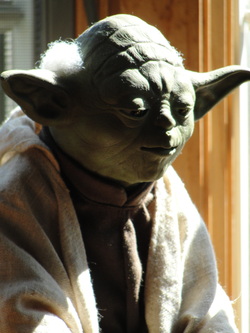
If it isn't clear from the Yoda in my teaching studio (pictured at left), I'm more than a little bit of a Star Wars geek. And while there are so many characters, planets, and moments I love in the Star Wars trilogy (the original one), what I want to write about today is my least favorite part of the movie: Dagobah.
I'm someone who loves action. I want to see the X-Wings dogfight with the TIE Fighters. I want the lightsaber duels. I want to see those adorable Ewoks take down the stormtroopers. And of course, I want the happy, triumphant ending. Good over evil. BAM. Done.
What makes me really uncomfortable are all those icky middle bits, like Dagobah. It's my least favorite part in Empire Strikes Back, it's one of the most irritating and boring levels in the LEGO computer game...I just don't like it. I'd rather be flying an X-Wing, not waiting around in Dagobah for it to get out of the swamp.
In The Hero With A Thousand Faces by Joseph Campbell (an amazing must-read, but give yourself lots of time and be patient...), he writes about the stages of the hero's journey. Simplified, it goes something like this: the call, descent into the underworld, and return to the external world. Luke gets the call to be a Jedi when he meets Obi-Wan on Tatooine, he trains to become a Jedi on Dagobah with Yoda, and then he returns to the fight between the Rebel Alliance and the Empire, transformed.
While I live for that final lightsaber duel in Return of the Jedi between Luke and Vader, I've been realizing more and more that Dagobah, back in Empire Strikes Back, is actually the most important part of the story. This is where Luke does the real work of becoming a Jedi. It's where he meets Yoda, his most important teacher. It's where he learns to connect with the Force and to find some measure of inner discipline. It's where he comes face to face with his biggest enemy: himself.
I think we can all identify with Luke. Luke wants to be a great Jedi, a great warrior. He wants to learn what he needs to know and get back out there to the action. He wants to skip ahead to the glorious parts and gloss over the hard, sweaty work. He sees himself taking on the Empire, flying off in his X-Wing and triumphantly defeating Vader. When he initially envisioned himself as a Jedi, he most certainly didn't see himself running laps around a swamp with a tiny green creature on his back pushing him harder and harder.
While most of us aren't training to save the universe as a Jedi, I do think there are a lot of parallels between the process of becoming a Jedi and the process of becoming a musician. When one feels the call to become a musician, we most likely see a performance of someone on stage and fall in love. We say to ourselves, "I want to do that." And instantly, in our mind, we see ourselves onstage playing the Tchaikovsky concerto before we even learn to hold the instrument. I know I'm certainly guilty of that. It's not a bad thing to have goals. What we need to realize, though, is where our goals are, realistically. A good violin teacher will not say "Okay, let's start Tchaikovsky!" More likely, you'll be given lots of scales, etudes, and pieces that are easier than Tchaikovsky. For years. It's a wonderful thing to have Tchaikovsky (or whatever your dream piece is) as a shining beacon for yourself. But you also have to run those laps around the swamp. You have to embrace the journey, come face to face with yourself and the reality of your violin playing right now, and put in the work.
How many of us, in our practicing, will play straight through a piece we love a couple of times and then call it a day? It's a lot more fun than practicing your scales, isn't it? It's not productive, though. Play-throughs as regular practice are a sure path to the dark side of sloppy and careless playing. Good practice that leads to the path of being a violin Jedi involves careful planning, attention to detail, and practicing and repeating small sections over and over again. Take a look at my blog post on Conscious Repetition for more on this.
The fact of the matter is that by focusing your attention on developing your skills, you actually are learning what you need to play your dream piece. I'll end this post by telling you a story from my own experience.
A few years ago, I learned the Tchaikovsky concerto for my graduate school auditions. It was a long, brutal process. The piece was definitely a "challenge" piece for me, and there was one passage in particular that just eluded me every time. For the violinists out there, it's that scale passage at the top of the fourth page, right after the second theme. Several long, fast scales that come at you one after another. I practiced this passage every way imaginable, and still, without fail, I blew it every single time I performed it.
I did, however, get into Peabody for graduate school (they stopped me before that passage in my audition), and I spent the next two years playing etudes and scales. I didn't touch Tchaikovsky or any repertoire of a comparable level to it. What I did do was play Kreutzer 2 for a month as I realigned my posture, reshaped my left hand, and essentially rebuilt my playing from the ground up. After my first year of grad school, I spent a summer only playing scales. Every key, three octaves. No repertoire.
During spring semester of my last year of grad school, I was having one of those practice days where I just wanted to play stuff. My year and a half of etudes and scales was really wearing on me. I'd finished my recital. So, just for the heck of it, I pulled out Tchaikovsky and just started playing, pretty mindlessly. When I got to that scale passage, I tossed it off like it was nothing. I couldn't believe it. I hadn't looked at it, hadn't practiced it, but because of the time I put in building the skills I needed to play it, I could.
The moral of this story is that Yoda is always right. And your personal Dagobah, all those icky middle bits of your journey, are actually the ones that will help you get to your goal. Do the work in the middle and don't be tempted down the path of only seeing the final product. For that path, young Jedi, leads to the dark side. And if you don't believe me, take it from the Jedi Master himself:
Ready are you? What know you of ready? For eight hundred years have I trained Jedi. My own counsel will I keep on who is to be trained. A Jedi must have the deepest commitment, the most serious mind. This one a long time have I watched. All his life has he looked away... to the future, to the horizon. Never his mind on where he was. Hmm? What he was doing. Hmph. Adventure. Heh. Excitement. Heh. A Jedi craves not these things.

 RSS Feed
RSS Feed